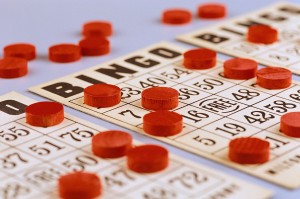One thing that’s normally shunned by people, especially the younger generation, is the good old game of Bingo. Most tend to write this off as a boring past time that elderly take part in to stave off boredom. But it turns out that the older folks who play Bingo are actually better off mentally than the rest of us.
 According to a 2002 study by Southampton University, regular Bingo players were found by researchers to be faster and have a higher accuracy rating of finding their numbers on cards than the non-bingo playing control group were. The groups were subject to several tests involving mental speed and memory as they had to quickly scan items for information and retain said data. Every time the tests were conducted the Bingo playing group would easily outclass the control group.
According to a 2002 study by Southampton University, regular Bingo players were found by researchers to be faster and have a higher accuracy rating of finding their numbers on cards than the non-bingo playing control group were. The groups were subject to several tests involving mental speed and memory as they had to quickly scan items for information and retain said data. Every time the tests were conducted the Bingo playing group would easily outclass the control group.
Gloria Pattinson, the Spokeswoman for the National Bingo Association commentated on the research saying it was all about personal skill and that in Bingo you need: “To be a good listener and search for those numbers quickly.” She continued describing how concentration was shown to rapidly decline with age and that regular interaction with games of Bingo was a great way for pensioners to improve their ability to hold their attention for long periods of time.
But it’s not just in a hall where you can play Bingo; there are also a ton of various Bingo sites that provide the digital equivalent of the iconic hall game. Only instead of yelling out “House!” in front of a hundred or so strangers, you can instead yell it from the comfort of your own home. If you would like to try some of these games out, a list of bingo sites can be found here for you to pick what game you think suits you best.
It’s not just Bingo games that can help with brain development, various video-games are being used in creating new and ground breaking forms of therapy for people suffering from various degenerative brain diseases. Take stroke suffers for example, a new therapy program had victims of horrific strokes taking part in regular games of the Kinect based Fruit Ninja, a fun game whereby players swipe at fruit onscreen using their limbs to score points.
 After extensive testing it was found that stroke victims were found to have promoted growth in the damaged sections of their brains. There was also an unseen side effect whereby suffers had reorganized their brain structures. At a cellular level, their brain chemistry and composition had changed to work around the damaged neurons, in the same way that road workers cut off broken lanes and funnel traffic around the damaged areas. The neurons were seen to be sending information around the damaged areas; it was something that helped exponentially improve the mobility of stroke sufferers from just two regular sessions of the game for an hour every week.
After extensive testing it was found that stroke victims were found to have promoted growth in the damaged sections of their brains. There was also an unseen side effect whereby suffers had reorganized their brain structures. At a cellular level, their brain chemistry and composition had changed to work around the damaged neurons, in the same way that road workers cut off broken lanes and funnel traffic around the damaged areas. The neurons were seen to be sending information around the damaged areas; it was something that helped exponentially improve the mobility of stroke sufferers from just two regular sessions of the game for an hour every week.
Another team at the Berlin Max Planck Institute in 2013 found that when exposed to regular games of Super Mario, their participants were shown to have areas of the brain that focused on movement; memory, situational awareness, empathy and co-ordination grow exponentially from just a few regular sessions. Through a process called neuro-genesis, the participant’s mental capabilities had grown far beyond what the researchers initially predicted.
Game therapy it seems is one form of healing that has near limitless benefits and should already be implemented throughout various care centres, but it hasn’t because of just one problem that this kind of therapy faces, and that is the continued stigma from the uninformed that video-games and gaming in general is seen to have harmful and degenerative effects. This couldn’t be any further from the truth as the evidence clearly shows that continued interaction with a medium that gives you instant feedback is a great way to improve brain growth.
In order to move the therapy’s research past its infancy stage and start breaking new ground in the ways we can combat degenerative brain disorders, we have to shed the stigma of video-games and show the world just how helpful this little digital distraction can be.
Photo Credits
Bingo – Microsoft Office Clipart Collection
Human Mind – Wikimedia Creative Commons
Contributing Author Bio
John Canlom
John Canlom is a gamer who grow up and now has a master’s degree in developmental psychology. An attempt to connect his love video games and today’s profession led him to study how games affect the brain and our abilities.


Please Share Your Thoughts - Leave A Comment!